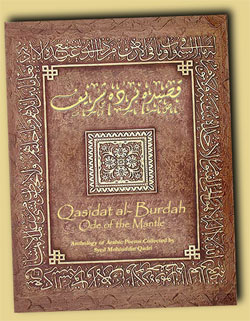| Download PDF Book for Free |
| Buy Hardcover Book for $29.95 |
| Read Book Online |
The main objective of bringing this Anthology of Arabic and Urdu poems on Islam and its illustrious Preacher Sallallahu Alayhi Wasallam, is to place them within the reach of such English-speaking people as take a keen interest in the faith of Islam and its propagation.
The book also contains such poems as were composed and recited in the defense and the support of Islam, at its very outset, by such persons as were well known for their high position, integrity of character, vast knowledge and sound judgement. They go far to prove clearly that Islam was never based on violence, force or use of the sword, but was only a form of religion founded on solid reason and pure morality, and quite in unison with the doctrines of God, previously preached by Abraham, Moses and Jesus, and merely remodeled now according to the wants of the time. Thus they give a strong rebuff to those Orientalists who have so assiduously made futile attempts to diminish the merits of the faith of Islam by their misleading representations.

My Master, descend peace and blessings continuously and eternally on Your Beloved, the Best of All Creation
The Qasida al-Burdah has had a great impact upon the history of the qasida genre as a whole. No other Arabic poem has been more frequently recited, translated, imitated or commented upon in so many languages of the Islamic world. The Qasida al-Burdah, al-Busiri’s most famous poem in praise of the Prophet. Its appellation “al-Burdah”, meaning a mantle of woolen cloth in Arabic, refers to another highly esteemed poem in praise of Muhammad which is known after its opening words as “Banat Su´ad” and was composed by Ka`b b. Zuhayr. After the recitation Ka`b received, as a reward for his poem, the Prophet’s mantle. When al- Busiri, some 650 years later, suffered a stroke and remained semi-paralysed, the Prophet appeared to him in dream guise, touched him with his hand and threw his mantle over his shoulders. al-Busiri was instantly cured and set about to compose his poem called, in reference to this miraculous healing, the “Ode of the Mantle”.

